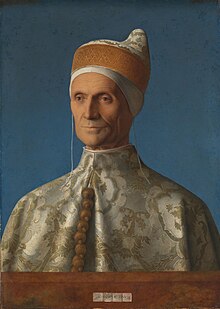Leonardo Loredan
Leonardo Loredan (born November 16, 1436 in Venice ; † June 21, 1521 there ) was the 75th Doge of Venice from 1501 to 1521 .
family
The Loredan family was first recorded in Venice in 1015. They worked as merchants, diplomats and in the Venetian military. One of the family members, Donata, was Marco Polo's wife .
Life
Loredan had served the republic as Podestà of Padua and as procurator . He was the son of Girolamo and Donata Donà. His marriage to Morosina Giustinian had nine children, including the procurator of San Marco Lorenzo Loredan.
The Doge's Office

During Loredan's reign, the armed conflicts fell with the League of Cambrai , an alliance between King Louis XII directed against Venice . , Pope Julius II , Emperor Maximilian , Ferdinand of Aragón and some small Italian states. The imperial troops were financed by funds from the Fuggers . Venice's mercenary troops were supported with large sums of money, in particular the Loredan family. The first victory fell to the League in the Battle of Agnadello , Venice lost by 20,000 soldiers on the battlefield, Andrea Gritti was , however, able to save around 25,000 men unscathed. Loredan fell out of favor with the people and the nobility when large parts of northern Italy subsequently came under the rule of the League.
The fortunes of war turned through skillful diplomatic tactics, supported by the Pope's turning. In 1510 a peace agreement was reached with the Pope, who lifted the excommunication against Venice. Loredan had managed to get some of Venice's possessions on the Terraferma for Venice. Venice, for its part, founded a league with the Pope, the Emperor and Spain, which was directed against France as a common enemy. Peace negotiations that were held in Mantua in 1511 could not prevent another war, as the emperor was now on the opposite side. As a result, the future Doge Andrea Gritti distinguished himself as a capable general . The war dragged on with changing alliances. Venice had not lost the war under Loredan, it had managed to hold large parts of the land, but the power of Venice was broken.
When he died, Loredan left a city that was heavily indebted because of the huge costs of the war . The simultaneous changes in trade routes due to the discovery of new continents and sea routes brought the formerly central trading city of Venice into a marginal situation. With Loredan's death, the power of Venice had passed its zenith.
photos
- Giovanni Bellini : Portrait of the Doge Leonardo Loredan . The National Gallery , London
- Giovanni Bellini and workshop: The Doge Leonardo Loredan with two magistrate officials, State Museums, Berlin
- Giovanni Bellini: The Doge Leonardo Loredan with four sons. Gemäldegalerie Berlin
- Vittore Carpaccio (attributed to): Portrait of the Doge Leonardo Loredan, Bergamo
- Vincenzo Catena : The Doge Leonardo Loredan is recommended by Saint Mark to the Madonna. Votive picture (around 1505), Museo Correr , Venice
- Palma Giovane : Allegory of the war against the League of Cambrai, Doge's Palace, Venice, Sala del Senato
- Girolamo Campagna : Seated figure of the Doge, tomb in San Zanipolo , Venice
- Alessandro Leopardi : medallion with the profile of Doge Leonardo Loredan, flag pedestal, St. Mark's Square / Piazetta, bronze relief
- Pietro Lombardo (attributed to): The Doge Leonardo Loredan, accompanied by three saints, kneels in front of the Madonna, marble relief, Sala degli Scarlatti, Doge's Palace
Tomb

His tomb is in the presbytery of San Zanipolo . It was only built in 1572 and later changed several times. The architecture and sculptures are by Girolamo Campagna and Danese Cattaneo, a student of Jacopo Sansovino . In the monument, Loredan is glorified as the savior of the Republic of Venice: the doge is located between the war opponents, the allegorical figures of Venice and the League of Cambrai. It is accompanied by Abbundantia (Abundance) and Pax (Peace). The tomb itself does not show any Christian motifs, but is a secular victory monument for Loredan.
literature
- Catarina Schmidt Arcangeli: Una sacra conversazione in famiglia. To the portrait of Doge Leonardo Loredan in the Berlin Gemäldegalerie . In: Martin Gaier, Bernd Nicolai, Tristan Weddingen (eds.): The incorruptible look. Festschrift in honor of Wolfgang Wolters. Trier 2005 pp. 283-291, ISBN 3-933701-19-8
- Andrea da Mosto: I Dogi di Venezia. Florence 1983.
- Helmut Dumler: Venice and the Doges. Düsseldorf 2001.
Web links
- Monument to Doge Leonardo Loredan
- museumplanet Monuments to Doge Leonardo Loredan and Michele Morosini
- museumplanet Monument to Doge Leonardo Loredan
- museumplanet ( Memento from July 30, 2010 in the Internet Archive ) Monument to Doge Leonardo Loredan - detail
| predecessor | Office | successor |
|---|---|---|
| Agostino Barbarigo |
Doge of Venice 1501 -1 521 |
Antonio Grimani |
| personal data | |
|---|---|
| SURNAME | Loredan, Leonardo |
| BRIEF DESCRIPTION | Doge of Venice (1501–1521) |
| DATE OF BIRTH | November 16, 1436 |
| PLACE OF BIRTH | Venice |
| DATE OF DEATH | June 21, 1521 |
| Place of death | Venice |

